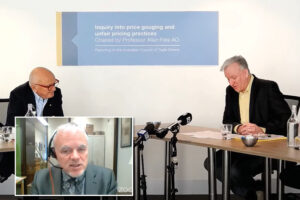Young Workers are “Shock Troops” of Precarious Labour Market
Dr. Jim Stanford, Director of the Centre for Future Work, appeared before the National Youth Commission on 31 October in Sydney to discuss the challenges facing young workers in Australia’s labour market.
The National Youth Commission into Youth Employment and Transitions has been holding an inquiry in communities across Australia to document the situation of young workers, who are experiencing much lower rates of employment and income than other workers.
Stanford’s submission argued that young workers are like the “shock troops” of the precarious labour market: the ones sent in first to confront an especially dangerous situation. The rise of precarious work in all its forms – part-time work, casual jobs, labour hire, temporary positions, marginal self-employment, and digitally mediated ‘gigs’ – now dominates youth employment patterns. And that situation will not automatically disappear as young workers get older and gain experience. Rather, evidence suggests that without policy measures to stabilise and improve jobs, this will be a permanent shift that gradually affects most workers. Already, less than half of employed Australians are working in a ‘traditional’ full-time permanent wages jobs with normal entitlements (like paid holidays, sick leave, and superannuation). For young workers, that ratio is less than one in five.
Stanford argued for targeted measures to stimulate more youth hiring into stable positions, an ambitious effort to rebuild vocational education in Australia and strengthen pipelines to post-education jobs, and a broader commitment to full-employment macroeconomic policy.
Related documents
You might also like
New laws for ‘employee-like’ gig workers are good but far from perfect
The Workplace Relations Minister Tony Burke has described proposed new laws to regulate digital platform work as building a ramp with employees at the top, independent contractors at the bottom, and gig platform workers halfway up. The new laws will allow the Fair Work Commission to set minimum standards for ‘employee-like workers’ on digital platforms.
More loopholes to close on insecure work … and a new right to disconnect from work
Late yesterday the final part 2 of the government’s Closing Loopholes industrial relations bill was passed by the Senate.
Opening statement to the ACTU Price Gouging Inquiry
This week Professor Allan Fels, the former head of the Australian Competition and Consumer Commission (ACCC), has begun an inquiry into price gouging across a range of industries, including banks, insurance companies, supermarkets, and energy providers. The inquiry commissioned by the ACTU comes off the back of the highest inflation in 30 years and the biggest falls in real wages on record.

